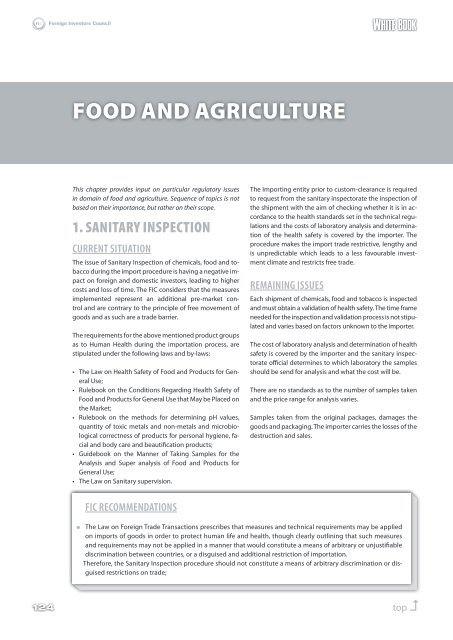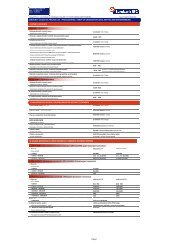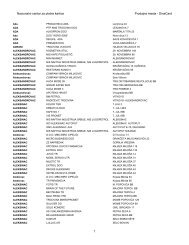Fic rEcommEndationS - Eurobank EFG
Fic rEcommEndationS - Eurobank EFG
Fic rEcommEndationS - Eurobank EFG
You also want an ePaper? Increase the reach of your titles
YUMPU automatically turns print PDFs into web optimized ePapers that Google loves.
FOOD AND AGRICULTURE<br />
This chapter provides input on particular regulatory issues<br />
in domain of food and agriculture. Sequence of topics is not<br />
based on their importance, but rather on their scope.<br />
1. SANITARY INSPECTION<br />
cUrrEnt SitUation<br />
The issue of Sanitary Inspection of chemicals, food and tobacco<br />
during the import procedure is having a negative impact<br />
on foreign and domestic investors, leading to higher<br />
costs and loss of time. The FIC considers that the measures<br />
implemented represent an additional pre-market control<br />
and are contrary to the principle of free movement of<br />
goods and as such are a trade barrier.<br />
The requirements for the above mentioned product groups<br />
as to Human Health during the importation process, are<br />
stipulated under the following laws and by-laws:<br />
• The Law on Health Safety of Food and Products for General<br />
Use;<br />
• Rulebook on the Conditions Regarding Health Safety of<br />
Food and Products for General Use that May be Placed on<br />
the Market;<br />
• Rulebook on the methods for determining pH values,<br />
quantity of toxic metals and non-metals and microbiological<br />
correctness of products for personal hygiene, facial<br />
and body care and beautification products;<br />
• Guidebook on the Manner of Taking Samples for the<br />
Analysis and Super analysis of Food and Products for<br />
General Use;<br />
• The Law on Sanitary supervision.<br />
<strong>Fic</strong> <strong>rEcommEndationS</strong><br />
The Importing entity prior to custom-clearance is required<br />
to request from the sanitary inspectorate the inspection of<br />
the shipment with the aim of checking whether it is in accordance<br />
to the health standards set in the technical regulations<br />
and the costs of laboratory analysis and determination<br />
of the health safety is covered by the importer. The<br />
procedure makes the import trade restrictive, lengthy and<br />
is unpredictable which leads to a less favourable investment<br />
climate and restricts free trade.<br />
rEmaininG iSSUES<br />
Each shipment of chemicals, food and tobacco is inspected<br />
and must obtain a validation of health safety. The time frame<br />
needed for the inspection and validation process is not stipulated<br />
and varies based on factors unknown to the importer.<br />
The cost of laboratory analysis and determination of health<br />
safety is covered by the importer and the sanitary inspectorate<br />
official determines to which laboratory the samples<br />
should be send for analysis and what the cost will be.<br />
There are no standards as to the number of samples taken<br />
and the price range for analysis varies.<br />
Samples taken from the original packages, damages the<br />
goods and packaging. The importer carries the losses of the<br />
destruction and sales.<br />
The Law on Foreign Trade Transactions prescribes that measures and technical requirements may be applied<br />
on imports of goods in order to protect human life and health, though clearly outlining that such measures<br />
and requirements may not be applied in a manner that would constitute a means of arbitrary or unjustifiable<br />
discrimination between countries, or a disguised and additional restriction of importation.<br />
Therefore, the Sanitary Inspection procedure should not constitute a means of arbitrary discrimination or disguised<br />
restrictions on trade;<br />
124 top �




